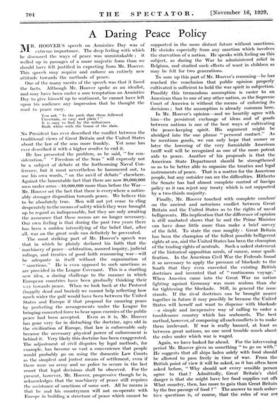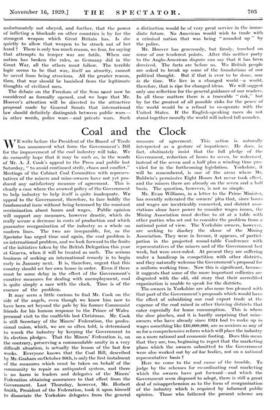A Daring Peace Policy M R. HOOVER'S speech on Armistice Day
was of extreme importance. The deep feeling with which he discussed the ways of peace was unmistakable ; it welled up in passages of a more majestic form than we should have felt justified in expecting from Mr. Hoover. This speech may require and enforce an entirely new attitude towards the methods of peace.
. One of the many merits of the speech was that it faced the facts. Although Mr. Hoover spoke as an idealist, and may have been under a sore temptation on Armistice Day to give himself up to sentiment, he cannot have left upon his audience any impression that he thought the road to peace easy.
You ask " Is the path that these followed Uncertain, or ,easy and plain ? "
It is easy to find by the milestones Built white with the bones of the slain.
No President has ever described the conflict between the traditional views of Great Britain and the United States about the law of the seas more frankly. Yet hone has ever described it with a higher resolve to end con- sideration." has presented the problem, as he " for con- sideration." " Freedom of the Seas " will expressly not be a subject of debate at the forthcoming Naval Con- ference, but it must nevertheless be hammered out, to use his own words, " on the anvil of debate" elsewhere. Against the lamentable fact that there are now 30,000,000 men under arms-10,000,000 more than before the War— Mr. Hoover set the fact that there is everywhere a notice- ably stronger disposition towards peace. We believe this to be absolutely true. Men will not yet cease to cling desperately to the means of safety which they were brought up to regard as indispensable, but they are only awaiting the assurance that these means are no longer necessary. Our own feeling is that during the past two years there has been a sudden intensifying of the belief that, after all, war on the great scale can definitely be prevented.
The most striking part of Mr. Hoover's speech was that in which he plainly declared his faith that the machinery of peace—arbitration, assured inquiry, judicial rulings, and treaties of good faith renouncing war—will be adequate in itself without the organization of " sanctions." He is even opposed to such sanctions as are provided in the League Covenant. This is a startling new idea, a daring challenge to the manner in which European countries have been gradually thinking their way towards peace. -- When we look back at the Protocol (happily dead- and buried) we cannot help reflecting how much wider the gulf would have been between the United States and Europe if that proposal for ensuring peace by perfecting the arrangements under the League for bringing concerted force to bear upon enemies of the public peace had been accepted. Even as it is, Mr. Hoover has gone very far 'in disturbing the doctrine, ages old in the civilization of Europe, that law is enforceable only because the necessary physical power of enforcement is behind it. Very likely this doctrine has been exaggerated. The adjustment of civil disputes by legal methods, for example, has become so vast a convenience that people would probably go on using the domestic Law Courts as the simplest and justest means of settlement, even if there were no army and no police to secure in the last resort that legal decisions shall be 'observed. For the present, however, Mr. Hoover, progressive though he is, acknowledges that the machinery of peace still requires the assistance of sanctions of some sort. All he means is that he and his countrymen will not co-operate with Europe in building a structure of peace which cannot be supported in the more distant future without sanctions:, He shrinks especially from any sanction which involves the starvation of a nation. He speaks with feeling on this subject, as during the War he administered relief in Belgium, and studied such effects of want in children as may be felt for two generations.
To sum up this part of Mr. Hoover's reasoning—lie has reached the conclusion that public opinion properly cultivated is sufficient to hold the war spirit in subjection/ Possibly this tremendous assumption is easier to an American than to one of any other nation, as the Suprenie Court of America is without the means of enforcing its decisions ; but the assumption is already common herei In Mr. Hoover's opinion—and we heartily agree with him—the persistent "exchange of ideas and of goods between nations is one of the best ways of cultivating the peace-keeping spirit. His argument might be abridged into the one phrase " personal contact." As he mentions goods, we can only hope that sooner or later the lowering of the very formidable American tariff wall will be recognized as one of the more potent aids to peace. Another of his proposals is that the American State Department should be strengthened so as to be better able to organize the treaties and legal instruments of peace. That is a matter for the American people, but any outsider can see the difficulties. Hitherto the Senate has had almost complete control of foreign policy as it can reject any treaty which is not supported by a two-thirds majority.
Finally, Mr. Hoover touched with complete candour' on the ancient and notorious conflict between Great Britain and the United .States as to the rights of naval belligerents. His implication that the difference of opinion is still unabated shows that he and the Prime Minister can have done little more than make a brief survey of the field. To state the case roughly : Great Britain' has been the champion of the fullest possible belligerent' rights at sea, and the United States has been the champion, of the trading rights of neutrals. Such a naked statement of the historical opposition needs, of course, some quali- fication. In the American Civil War the Federals found it so necessary to apply the pressure of blockade to the South that - they even exceeded the existing British doctrines and invented that of " continuous voyage." When America came into the Great War no nation fighting against Germany was more zealous than she for tightening the blockade. Still, in general the -issue stands. If the rival doctrines can be brought nearer together in future it may possibly be because the United States will herself not want to dispense with. blockade —a simple and inexpensive way of calling to order a troublesome country which has seaboards. The best method, however, of composing all such conflicts is-to make them irrelevant. If war is really banned, at least as between great nations, no one need trouble much about the rules under which war is waged.
Again; we have looked far ahead. For the intervening period Mr. Hoover gives us something " to go on with." He suggests that all ships laden solely with food should be allowed to pass freely in time of war. From the British point of view it will be asked,-as it has often been asked before, " Why should not every sensible person agree to that ? Admittedly, Great Britain's chief danger is that she might have her food -supplies cut oft* What country, then, has more-to gain than Great Britain by the -free passage of food ? ". The answer to such seduc- tive questions is, of- -course,- that- the rules of- war are unfortunately not obeyed, and further, that the power of inflicting a blockade on other countries is by far the strongest weapon which Great Britain has. Is she quietly to allow- that weapon to be struck out of her hand ? There isonly too much reason, we fear, for saying that attempts to temper war are futile. When one nation has broken the rules, as Germany did in the Great War, all the others must follow. The terrible logic seems to be that war,. itself an atrocity, cannot be saved from being atrocious. All the greater reason, then, that war should be banished from the legitimate thoughts of civilized men.
The debate on the Freedom of the Seas must now be considered as formally opened, and we hope that Mr. Hoover's attention will be directed to the attractive proposal made by General Smuts that international law should definitely distinguish between public wars— in other words, police wars—and private wars. Such a distinction would be of very great service in the imme- diate future. No American would wish to trade with a criminal nation that was being " rounded up " by the police.
Mr. Hoover has generously, but firmly, touched on some of our tenderest points. After this neither party to the Anglo-American dispute can say that it has been deceived. The facts are before us. We British people are asked to break up some of the foundations of our political thought. But if that is ever to be done, now is the time. We live in a changed world—a world, therefore, that is ripe for changed .ideas. We will suggest only one reflection for the general guidance of our readers. In all these matters there is a traceable " risk," but by far the greatest of all possible risks for the peace of the world would be a refusal to co-operate with the United States. If the English-speaking races do not stand together morally the world will indeed fall asunder.









































 Previous page
Previous page